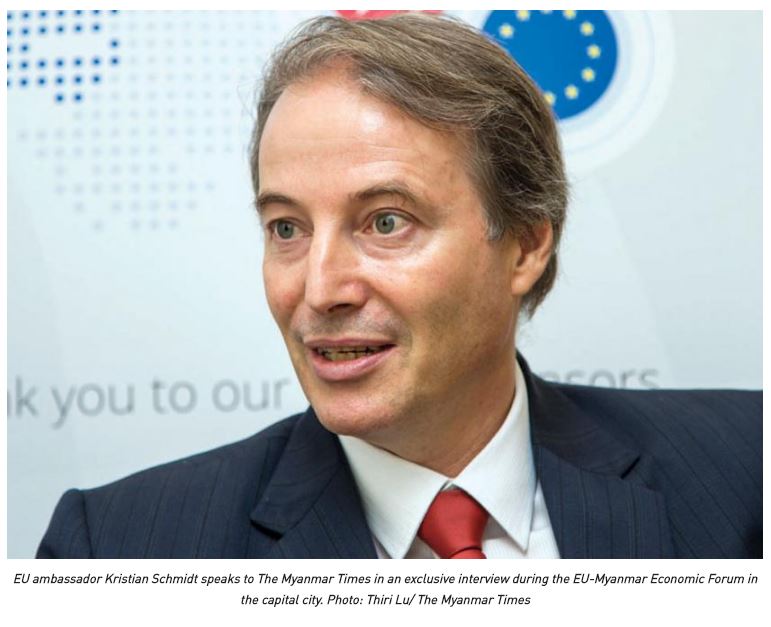Myanmar: Tourism industry inseparable from political problems, EU envoy warns
The prospect of Myanmar’s tourism hinges upon the country’s political development, the European Union’s top envoy told The Myanmar Times.
“If a country is unstable or does not follow human rights or democratic norms, tourists, especially those from Europe, are less inclined to visit,” Kristian Schmidt, the European Union ambassador to Myanmar, remarked, while stressing that bilateral trade between the country and the bloc is growing and economic partnerships are strengthening, despite not living up to initial expectations.
The Myanmar Times conducted an exclusive interview with the ambassador at the EU-Myanmar Economic Forum. This year’s annual forum was held on June 6 at Kempinski hotel in Nay Pyi Taw. An excerpt of the interview is included below.
The economic partnership between the European Union and Myanmar is still weak. Does the EU have any plans to promote economic coopera Myanmar?
There are many improvements in EU-Myanmar cooperation, especially in economic matters. If Myanmar firms export to EU, they can enjoy “Most-Favoured Nation” status and export freely to 28 EU member states. So, Myanmar’s exports to EU will increase. Myanmar and EU trade volume continues to improve which is now about 3.7 times more than that in 2013. Another thing is in EU-Myanmar trade, Myanmar has a trade surplus, it is exporting more than EU.
Businesses expected inward European investments to significantly scale up under the National League for Democracy-led government. It has been two years since the government took office, but this has not materialised. What is happening?
In my opinion, trade is improving. But it hasn’t reached the level expected by Myanmar people two years ago. It is true that the trade sector only improved to a satisfactory level. We expected it to increase by 10pc but it reached only 6-7pc because the government is a new one.
Another factor is that the government is focusing on various issues, especially peace and democracy matters. However, every problem cannot be solved as easily as we think, as solutions take time. For example, we can see that the Rakhine issue is affecting the national economy to some degree. Arrangements are being made as much as the government can achieve, and for the country to have an improved image in the international community.
The next thing is that all the problems did not spring up during NLD-government’s term. These matters were also being resolved under previous governments. Maximum effort has been put to search for solutions and also the Advisory Commission on Rakhine State, chaired by Kofi Annan, was formed. By looking at these actions, Myanmar [the government] seems to be trying hard to move forward in the forthcoming years.
The prevalent view among European investors who are looking into Myanmar is that we all are still figuring out the implications and details of the Investment Law, minimum wage and changes. The problems are piling up more and more and they can only be managed with the government in collaboration with the EU, and not by dealing with the problems on their own.
What areas in the Investment Law need to be addressed in order for European investments to flow in?
Frankly, what the EU investors see, in regards to the investment law, is that if every investment made by EU companies in Myanmar is given the opportunities, and without unnecessary intervention from the government, then more investments will come here.
Which sectors in Myanmar attract the most interest from European investors?
Apart from the energy sector, the other sectors which can attract inward investments are agriculture, livestock, aquaculture and tourism. These sectors are most likely to receive investment.
Meanwhile, sustainable energy and
renewable energy like the solar and hydroelectric sectors are also areas which are of potential investment interest. But one thing is certain: If we talk about tourism, it is inseparable from politics. If a country is unstable or does not follow human rights or democratic norms, tourists, especially those from Europe, are less inclined to visit.

This interview has been translated and edited for length and clarity.
Source: https://www.mmtimes.com/news/tourism-industry-inseparable-political-problems-eu-envoy-warns.html


 Thailand
Thailand




